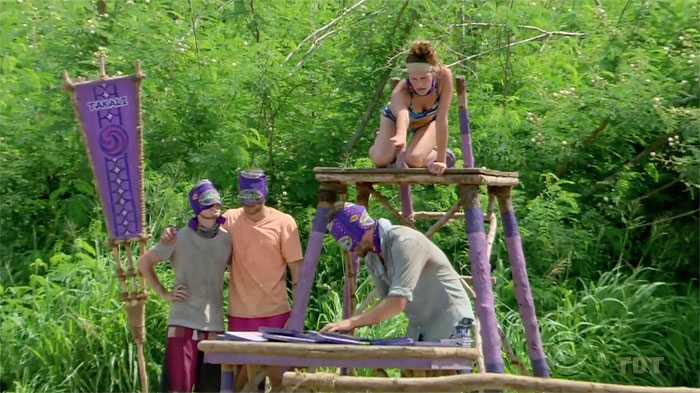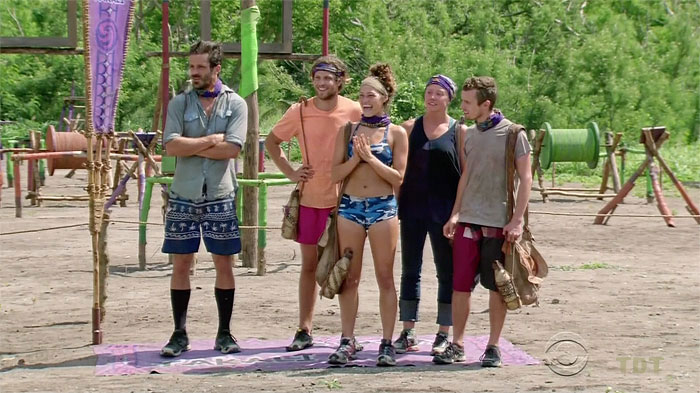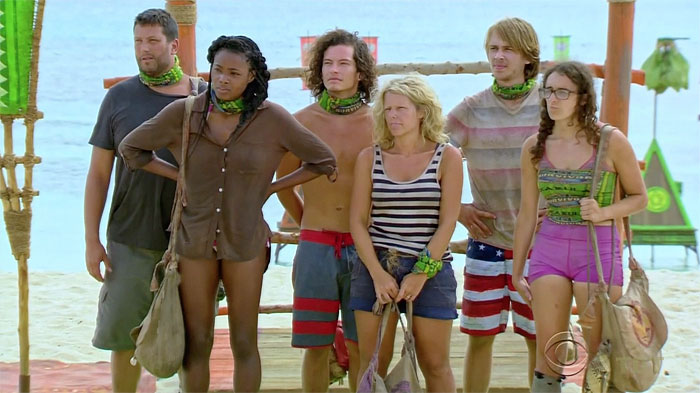

Figgy, Figgy, Figgy. Poor Figgy.
I can’t remember a player looking worse in recent memory.
But let me say something here about the theme of this season. While I liked the experiment on paper, I do think this theme has been rammed over our heads way too much. To think that these stereotypical descriptions of the generations are accurate would be very wrong.
With that said, Figgy perfectly represented negative millennial stereotypes.
I’ve been teaching millennials for about 11 years now. I’ve basically seen the entirety of that generation’s adults in a college classroom setting. And from what we saw of Figgy, she represents some of the problems.
Look, as I’ve said repeatedly, I think millennials are pretty great. Figgy represents the negative attributes better than anyone on this season, though. Taylor is bro. Bros always exist, regardless of generation. Mari played video games, but smart folks always exist. Michelle is a hippie/religious person. Always existed. I could go on and on.
But Figgy?

Well, what did we see out of her this season? We saw a person who acted without thinking a lot. We saw a person who thought she was really special, to the point where a vote against her was an affront. We saw a person who was incredibly self-involved. I don’t mean selfish, but rather someone who didn’t pick up on context cues, someone who couldn’t understand why anyone would vote for her. We saw someone who simply always thought they were the smartest and looked for short-term satisfaction such as when she argues with people whose votes she needed. Figgy seemingly could not understand why anything she did was a negative and why anyone wouldn’t see the world her way. And now she’s gone.
While most millennials are nothing like her, Figgy really did embody all the negative millennial stereotypes.
So is there a theory to describe this? Yep. It’s called selective exposure theory. And in a year of a political election, this theory is very timely right now.
Basically, selective exposure theory describes people’s tendency to seek out and believe information that caters to their predetermined world view. For example, this theory would describe a conservative voter who only gets their news from Fox News or Rush Limbaugh. This is similar to the popular phrase confirmation bias.
This is a very popular theory in political communication studies and psychology. Fundamentally, when we only seek out information that reinforces our preexisting ideas, we create what theorists call an echo chamber. We believe something, we seek out info that says this and then the cycle continues. We never hear contradictory information or opinions. It’s impossible to stop believing what you think or to change your mind because all the info you get tells you you’re right.

So what does this have to do with Figgy? Simply put, any reasonable person would understand that pairing up romantically with Taylor is a bad idea. That proclaiming her happiness for Michelle sticking around is a bad idea. That not understanding why Adam voting against her would be a good idea. That not understanding her tribemates would detect her relationship with Taylor. Over and over, Figgy seemed to seek out information that would only fit into her preexisting worldview. When you do that, you run the risk of not learning.
That’s what happened to Figgy. She created an echo chamber designed to make it seem OK that she kept making horrid mistakes in the game. In the end, in prevented her from really working with Adam or trying to make better relationships with the Gen Xers so she could effectively boot Adam if she thought he was a threat. Overall, Figgy’s inability to listen to numerous people telling her showmance was a bad idea or trying to understand that other people have motivations also, effectively sunk her chance to win.
If Figgy wasn’t selective about the information she sought out, she may have stuck around longer or made much better decisions.
That’s it on this end. I’m at the tail end of a big deadline, so starting next week, I’ll return with more nuanced descriptions of the theories, but I haven’t had tons of time for that recently. Sorry. But, here’s a treat:
Here are the rankings I have for the castaways right now. Basically, this is all based on who I think can win, not how far I think they’ll go. So, one to 14, one being the most likely to win, according to me. Here we go:
Vanua

- 1. Chris — Not much happening with Chris this week and while I think he makes the merge, Chris isn’t winning. However, I do think he has a better chance than many. Let’s put him in the middle: Ranking: 9.
- 2. David — While I don’t have any doubt that David will be around for a while, I just don’t see him winning this game. The way he’s moved from alliance to alliance and seems to be plotting to turn on others, it just won’t play with most juries. Now, of course, there’s a chance we get a non-bitter jury and they’ll reward his Big Moves™, but the chances of that are low. Ranking: 7.
- 3. Michelle — Let me just point this out again: I think Michelle is playing a great game so far. With that said, I don’t think she wins this game. Basically, I think Vanua is going to tribal one more time before the merge. They are just not a strong tribe in that way. And if they go to tribal, I’d bet decent money Michelle goes home. So, through no fault of her own, I think Michelle doesn’t have much chance. Ranking: 13.
- 4. Zeke — I don’t think Zeke actually wins, but I do think he might make the end, so therefore he gets a good ranking. Basically, like David, I just don’t think a jury will reward Zeke for the moves that editors have foreshadowed. Zeke will turn on Millennials and that’s going to be a problem in the end game. Ranking: 5.
Ikabula

- 1. Bret — Let’s be honest, Bret isn’t winning. He’s an invisible player. But, we did see that hug last week. That means people are liking Bret. That’s why I have him ranked a bit higher than, say … the next person on the list. Ranking: 11.
- 2. Sunday — This is my pick for someone who could go very far, but has no chance of winning. First, the edit doesn’t support Sunday winning. But, second and more importantly, nothing Sunday has done so far this season suggests she’s making strategic moves to win. Ranking: 14.
- 3. Hannah — Now, I don’t think Hannah will win, but when I look at this cast, I don’t think many can win. That means Hannah gets ranked highly. Basically, we know Hannah can strategize; we’ve seen it, sort of. We know she’ll have no issue turning on other Millennials, so I can see her joining a dominant alliance, post-merge. I also don’t think she’ll piss anyone off. With all that in mind … Ranking: 6.
- 4. Michaela — I love Michaela. She’s one of two people I’m really rooting for this season. But, as I mentioned last week, she simply cannot control her emotions. It’s going to upset jury members. It simply doesn’t play in both Survivor, or real life. I do think she’s going far and maybe she simply challenge beasts herself to a victory. I don’t know. But, I could be wrong … and I hope I am. Ranking: 4.
- 5. Will — Purple Kelly is now on this season. It just so happens that this Purple Kelly loves Ronald Reagan. Will ain’t winning. And I don’t think he gets very far either. I could be wrong, but I see him as an easy boot at like 8th. Ranking: 12.
- 6. Jay — The Winner’s Edit™ machine totally fired up a strong Jay narrative this week. And Jay has a few things going for him: He seems well liked, he has an idol, and he’s not the physical beast some other castaways are right now. Ranking: 2.
Takali

- 1. Ken — Like Michaela, Ken is the other person I find myself really rooting for right now. But, with Millennials basically running the show right now and definitely having the majority at the merge, I think Ken goes relatively far, but gets booted about four episodes from now. However, he clearly has a very good chance of winning if I’m wrong. People like him, he’s making moves and he could ride individual immunity for a while. He gets a high ranking on chance to win, even if I don’t think he will. Ranking: 5.
- 2. Jessica — I thought Jessica had a really good week. She made some inroads with Adam that eventually worked. Also, Jessica, lately, seems to be flying under the radar a bit. If she makes the merge, she can continue with that strategy and go a while. I just don’t think she stands a chance of winning though. Basically, the edit tells us she’ll be giving up the Legacy Advantage. And If she gives that up, that means she’s out. Ranking: 10.
- 3. Adam — Here’s my pick right now. He’s received an awesome edit, he’s playing really well and I do think he can move a little under the radar. He’s also the only person with an idol that nobody else knows about. That’s huge. Ranking: 1.
- 4. Taylor - I was going to throw Taylor at the bottom of this list, but the more I thought about it, the more I think Figgy’s boot helps nobody more than it helps Taylor, ironically. We know many Millennials disliked Figgy more and we know Taylor is awesome at challenges. And we know Millennials will have an advantage. I’m putting Taylor right near the middle for those reasons. Ranking: 8.
Well, the play hasn’t been great, but this season sure does keep surprising us. Let’s hope it’s the same thing next week. We’ll revisit these rankings after the merge episode.
 Pat Ferrucci started watching Survivor when Episode Two of Borneo first aired. He's seen every episode since. Besides recapping here, he'll be live-tweeting this season from the Mountain Time Zone. Why? Because nobody cares about the Mountain Time Zone except when they want to ski. Follow him @patferrucci for Survivor stuff and tweets about anything and everything that enters his feeble mind.
Pat Ferrucci started watching Survivor when Episode Two of Borneo first aired. He's seen every episode since. Besides recapping here, he'll be live-tweeting this season from the Mountain Time Zone. Why? Because nobody cares about the Mountain Time Zone except when they want to ski. Follow him @patferrucci for Survivor stuff and tweets about anything and everything that enters his feeble mind.
- Index of articles
- Cast preview: And the winner? I don't know?
- Ep.1: All about the power of the prime
- Ep.2: Michelle guides the organism
- Ep.3: Paul's poorly framed response sinks him
- Ep.4: Dissonance dismisses silence
- Ep.5: David continues forcing others to innovate
- Ep.6: Figgy sees selectively, gets the boot
- Ep.7: Michaela gets dysfunctional and gets dys-boot
- Ep.8: How the castaways stack up post-merge
- Eps.10-11: Jessica's dismissal just part of the agenda
- Ep.12: Will seeks his trophy, Zeke hits the road
- Ep.13: Who holds the most finale power?
- Pre-Ep.14: Jury jeopardy